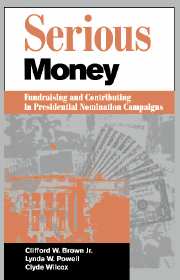Book contents
- Frontmatter
- Contents
- List of figures and tables
- Acknowledgments
- 1 Introduction
- 2 The regulatory environment
- 3 The contributor pool
- 4 Mobilizing the pool: Methods of soliciting campaign funds
- 5 Candidate resources
- 6 Recruiting contributors and solicitors: Candidate and individual decisions
- 7 Conclusion
- Appendix I The 1988 and 1992 presidential nomination surveys
- Appendix II 1988 and 1992 survey items used in the analysis
- Notes
- Bibliography
- Index
7 - Conclusion
Published online by Cambridge University Press: 27 August 2009
- Frontmatter
- Contents
- List of figures and tables
- Acknowledgments
- 1 Introduction
- 2 The regulatory environment
- 3 The contributor pool
- 4 Mobilizing the pool: Methods of soliciting campaign funds
- 5 Candidate resources
- 6 Recruiting contributors and solicitors: Candidate and individual decisions
- 7 Conclusion
- Appendix I The 1988 and 1992 presidential nomination surveys
- Appendix II 1988 and 1992 survey items used in the analysis
- Notes
- Bibliography
- Index
Summary
The campaign finance process unfolds as an interaction of two sets of decisions, one by the campaigns, and the other by potential contributors. Campaigns must assess their resources and identify their most likely financial constituencies. They must then determine the best methods to approach these constituencies, considering carefully the likely motives of those whom they hope will contribute to their candidates, and the benefits that their resources allow them to offer to those potential contributors. Potential contributors must decide whether to contribute to a candidate and how much to give. More than a third of contributors are asked to give to more than one candidate, and these contributors must make separate but possibly related decisions about giving to each candidate who asked them.
Campaigns that build personal-solicitation networks must also decide which of their contributors they will ask to solicit on behalf of others. Campaigns with relatively broad pyramids rely on fewer solicitors, but ask that they each raise proportionately more money. Campaigns with relatively deep pyramids rely on more solicitors, who must therefore raise proportionately less money. Those who are asked to solicit must decide whether to spend the social, political, and occasionally economic capital to become more involved in the campaign. They presumably assess the likely benefits of active participation, and may consider the probability that the candidate will win.
The decisions by campaigns are constrained by two sets of factors: the legal regulatory structure, and the need to solicit largely from the existing pool of contributors. The rules limit the maximum size of the contribution, therefore creating the need to solicit at a minimum tens of thousands of potential donors.
- Type
- Chapter
- Information
- Serious MoneyFundraising and Contributing in Presidential Nomination Campaigns, pp. 139 - 148Publisher: Cambridge University PressPrint publication year: 1995

